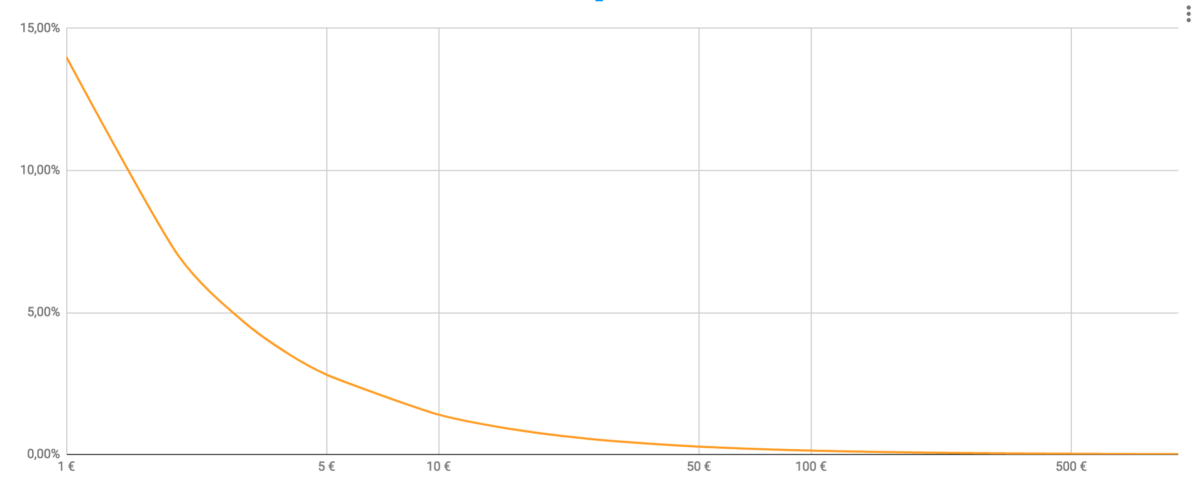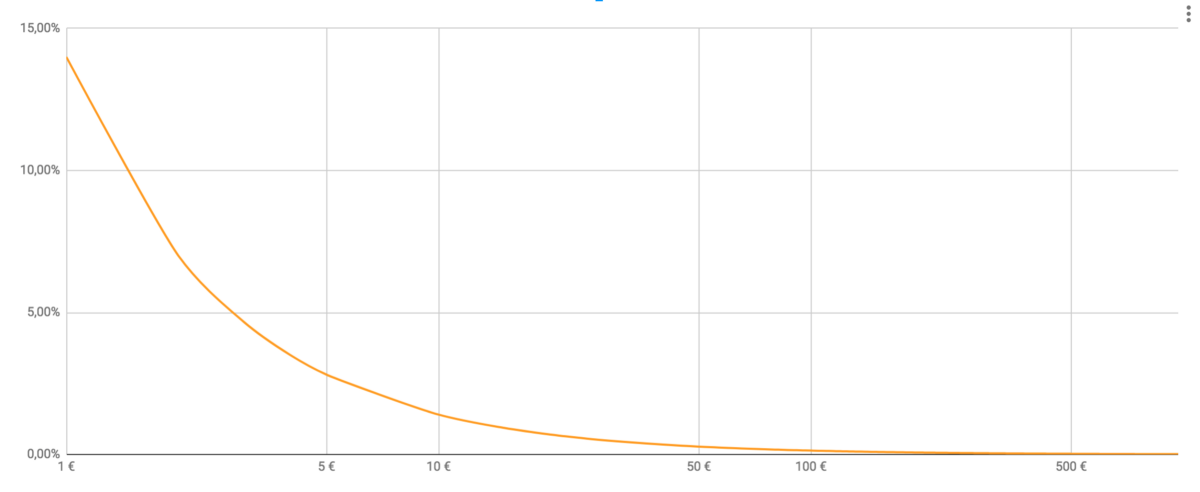# Non-technical paper
Betting is a juicy business, but mostly for the casino. Even in sports betting, which requires a lot of strategy, very few people can bet for a living. The house always wins because they are keeping some of the money. Inevitably, bettors end up loosing.
Can the blockchain change this ?
The blockchain is a technology that empowers communities by cutting middle-men and bottlenecks in many configurations.
In this paper, we will demonstrate how we can make “fair bets” using two key features of the blockchain : crypto-currencies and smart contracts.
With this explanation comes a functional proof-of-concept (POC) : the betdemocracy.org sports betting platform. Why sports betting ? Sports betting is huge on the internet and bookmaker margins are up to 10 times bigger that in any other betting types.
What is a “fair game” ?
A fair game is a game where the rules are not favorable to a specific side. Let’s say that two players play heads or tails for 1 € each throw, and get 2 € in case of win. In the long term, they will almost finish in the position they started in. We can say that this game is fair.
If players get rewarded 1,80 € per win by a middle-man (the coin-thrower), they will both finish broke soon if they keep playing. That game is not fair and it’s more or less what happends in casino games like black jack or roulette.
Real life case
In our example, we will use 1X2 soccer bets on the World Cup 2018 in Russia. In this kind of game, you can bet for the 3 possible outcomes : a home team win, an away team win or a draw. As stronger teams have more chances to win, each of the 3 outcomes has a specific odd. In other words, you will get a bigger reward if you betted for the underdog than if you betted for the favorite. Let’s have a look to the odds for France X Peru in one of the major betting sites in the world (odds are almost similar in all platforms).

Odds for France X Peru soccer game. Fractional and moneyline odds are calculated from decimal values.
The total exceeds 100 %. This represents a bookmaker margin of 5,01%, which is not bad, margins are usually between 5% and 15% in those bets.
Now, let’s compare it with a “perfect” situation where the bookmaker doesn’t take any margin :

We estimate odds with cross-multiplication. Fractional and moneyline odds are calculated from decimal values, rounded to 0.01.
As you can see, all odds are better without the bookmaker margin. You may think that 5% doesn’t count very much, but it’s a huge difference. Have a look of betting experts’ yields on this website and you will struggle to find a pro better with a ROI > 5% .
How can we get rid of bookmaker margin ?
To get rid of the bookmaker margin, we have to get rid of the bookmaker itself. That is where the blockchain can help us.
A blockchain is a network were the power is decentralized and shared to the whole network. Our choice for this project is the Ethereum blockchain for many reasons :
- It’s the 2nd biggest in market cap (right after Bitcoin), so many people own Ethers, its crypto-currency
- Unlike Bitcoin, it support smart contracts. There is a well-documented language for those contracts : Solidity
- There is a strong community and there is many projects on top of it
Ethereum acts like a single universal computer where you can add pieces of code : smart contracts. A smart contract is like a digital contract between one or several entities. It also acts like a wallet as it can receive and store money. Our smart contract will store opponents’ bets safely and return the money back to the winner.
Betting against each other
At this point there is a big difference: in betting sites, you always play against the house. The casino takes all bets.
Without casino, you have to play against someone betting for the exact opposite. For “France X Peru”, if you bet for a “France win”, you need someone betting for a “Peru win or draw” and agree on the odds and the stake. With that said, we are clear that we must have a platform to connect people.

To keep it simple, we look for one person to complete the player’s bet using double-chance bets (like “Peru win or draw”). It can work with more opponents : a “draw” bettor and a “Peru win” bettor. We also can have several players that join their stake to meet opponents requirements. But let’s keep it simple for now.
Indeed, our proof-of-concept is like a marketplace, but we can imagine an automated platform like an exchange it the future.
The cost of the bet
Let’s be clear : at the time we are writing this, crypto-currency transactions and smart contract execution require (small) fees. We will not achieve a “perfect” fair bet because the cost is not zero BUT we will consider that a bet is fair if the cost is ≤ 0,01 % of the total stake.
To make that number more visual, imagine that you bet for the 3 possible outcomes of a game (just for the example). It means that just one bet per match would be correct. In traditional betting sites, your initial stake will reduce by more than half after 14 games. With what we consider a fair game, you need to do the same for 6931 games to see your stake reduce to half of what it was. It is a ridiculously high amount of games so we can agree that the bet is “fair”.
In blockchains, fees are not based in the amount of money that is sent, but on the computation power that is needed to process the transaction. It means that fees are fixed costs. The higher the stake, the lower the cost in percentage.
Based on previous transactions on Bet Democracy, we found out that the average bet needs around 35 000 gas to be processed. In Ethereum, gas is the basic unit for computing power. The more complicated the function you call, the more gas you spend. And, of course, you have to pay your gas : )
You can choose the price you pay to skip the line or save money (or somewhere in the middle). In this example, we are using the SafeLow gas price of 1 gwei, it’s the lowest price then ensures you that the transaction will be validated for sure. As this is a non-technical paper I don’t want to enter too much into details, but another paper will be created with more explanations.
At today’s rate of 1 ETH = 401,49 €, the price of the bet is 0,15 € divided by the bettors. Let’s make a chart.

Bet cost in percentage based on total stake in Euros (logarithmic scale).
There is 2 important points in this chart :
- At 3 € of bet total stake (your stake plus your opponent’s), the bet is cheaper than in almost all betting sites (< 5%).
- At 935 € of bet total stake, the fees are equal to 0.01 % and we consider it a “fair bet”.
Conclusion
With this paper and the Bet Democracy platform example, we proved that we can achieve a virtually “fair game” in Sports betting.
We strongly believe that we can decrease the gas needed by optimizating the smart contract to lower that 935 € “fair bet” step. In addition to that, as blockchain technology quickly improves, transaction prices are lowering. Transactions are already free in many blockchains.
So, YES, blockchains can provide “fair bets” and YES it is probably going to disrupt the betting industry. Blockchain betting enables many possibilities, especially everything about reducing costs, bet trading and anymousity.
Of course, there is some obstacles : crypto-currencies are not yet widely used by bettors and people need to gain confidence in blockchains. Security can be a big deal too, as we already saw smart contracts being robbed by hackers. But we are really confident about the fact that there is a bright future for blockchain betting.
If you read until this point, we recommend that you have a look at the POC version of Bet Democracy that enables bets with dummy-money (Ropsten Ethers). Make sure to have the MetaMask extension on your browser.
Our plan is to build a fully functional version on the main Ethereum network with real money. We are looking for funding, sponsoring and anything that can help us achieve our goal. If you are interested, write us at hello@betdemocracy.org.



